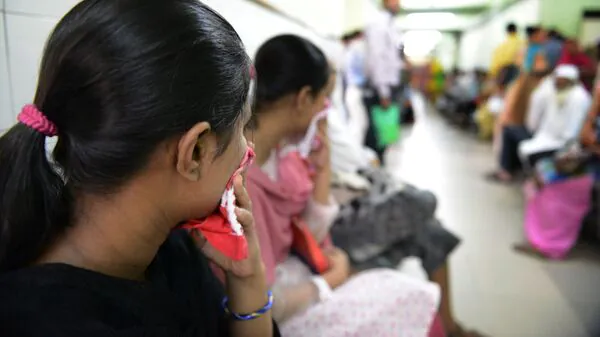Transgender Children, Siblings Of Central Govt Staff To Get Healthcare Benefits
New Delhi: In a significant move to ensure inclusive healthcare, the Union ministry of health & family welfare has issued new guidelines to extend medical facilities to fully-dependent transgender children and siblings of central government employees, according to two officials and an office memorandum reviewed by Mint.
The decision, dated 16 September, was taken in compliance with the Transgender Persons (Protection of Rights) Act, 2019.
Central government employees, their dependents, and pensioners avail comprehensive, affordable healthcare under the Central Government Health Scheme (CGHS). Serving central government employees also avail healthcare facilities under the Central Services (Medical Attendance) Rules, 1944.
Also Read | A crisis of inclusivity: Spare a thought for transgender studentUntil now, CGHS dependency criteria covered children who were wholly dependent, with sons eligible only if they were under 25, unmarried, or not earning.
The new rules mark a crucial shift by removing the age barrier for dependent transgender children and siblings.
The new policy allows for medical coverage for these individuals irrespective of their age, provided they meet two key conditions.
First, the individuals must be wholly dependent on the central government employee, with their income not exceeding the specified financial limit. The dependency income limit was previously revised in 2016 following the 7th Central Pay Commission, increasing from ₹3,500 to ₹9,000 per month, plus the amount of dearness relief on a basic pension of ₹9,000.
Second, the individual must have a certificate issued by a District Magistrate under the provisions of the Transgender Persons (Protection of Rights) Act, 2019.
Also Read | Government extends one-time option for central govt employees to switch to UP“This initiative will have a substantial impact on beneficiaries by ensuring that transgender family members have access to the same medical benefits as other dependents. The Central Government Health Scheme provides comprehensive healthcare, including a wide range of services such as consultations, diagnostics, and treatments across various specialties," said the first of the two officials cited earlier, both of whom spoke on the condition of anonymity.
Queries sent to the health ministry remained unanswered till press time.
The overall CGHS network covers millions of beneficiaries, offering a wide array of medical services. This includes facilities for general medicine, surgery, cardiology, ophthalmology, and various other specialized treatments, which are now extended to this newly-included group.
“The guidelines are a crucial step towards implementing the provisions of the 2019 Act and promoting the well-being and rights of the transgender community by securing their access to essential healthcare services. This policy change reflects the government's commitment to creating a more inclusive and equitable society, where all individuals, regardless of their gender identity, can access the medical care they need," said the second official.
Experts said the government's decision to extend CGHS benefits to dependent transgender children and siblings is a progressive move rooted in equity, efficiency, and dignity. This policy is a crucial step towards inclusive healthcare, affirming that the transgender community belongs and their health matters.
Also Read | India's most indebted states seek larger share of Central revenue, fiscal relieShailja Mehta, managing partner at non-profit organization Dasra, said that the government decision to include transgender people in the Central Government Health Scheme is a significant move towards a more inclusive healthcare system.
“This expansion is seen as a vital step in addressing the historical exclusion of transgender individuals, particularly youth, from formal healthcare. By formally recognizing them as dependents, the policy aligns with the Transgender Persons (Protection of Rights) Act, 2019, and helps build trust and dignity within the community," she said.
Dr. Alexander Thomas, founder and patron, Association of National Board Accredited Institutions (ANBAI) said that the government's decision to extend CGHS benefits to dependent transgender children and siblings is a significant and progressive move.
“As a public health expert, I see this as a positive step for three key reasons: equity, efficiency, and dignity. First, it promotes equity by ensuring that healthcare is accessible to marginalized communities, aligning with the principle of "leaving no one behind." Second, it improves efficiency by enabling early and preventive care, which can reduce long-term healthcare costs associated with advanced illnesses. Finally, it affirms the dignity of transgender individuals by recognizing their health as a fundamental human right, sending a powerful message that their lives matter."
Legal Disclaimer:
MENAFN provides the
information “as is” without warranty of any kind. We do not accept
any responsibility or liability for the accuracy, content, images,
videos, licenses, completeness, legality, or reliability of the information
contained in this article. If you have any complaints or copyright
issues related to this article, kindly contact the provider above.
Most popular stories
Market Research

- Industry Leader The5ers Expands Funding Programs To U.S. Traders
- Excellion Finance Scales Market-Neutral Defi Strategies With Fordefi's MPC Wallet
- Xfunded Expands In Dubai, Strengthening Collaborations With Trading Influencers Across Europe
- Chaingpt Pad Unveils Buzz System: Turning Social Hype Into Token Allocation
- PLPC-DBTM: Non-Cellular Oncology Immunotherapy With STIPNAM Traceability, Entering A Global Acquisition Window.
- Thrivestate Launches“Fly Before You Buy” Program, Enabling International Buyers To Explore Dubai Before Committing






















Comments
No comment